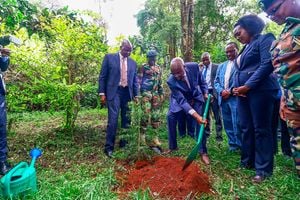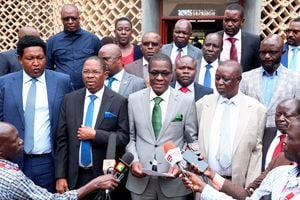Court cases over boundaries could delay next polls

Mr Justice Mohammed Warsame. Photo/MOHAMMED AMIN
Fresh questions have been raised over how long the Judiciary will take to determine the numerous petitions and judicial review cases challenging the creation of new electoral boundaries.
The Independent Electoral and Boundaries Commission (IEBC) Act establishes a 90-day period in which to conclude the High Court cases, but it does not specify a time period for parties who are dissatisfied to lodge an appeal either at the Court of Appeal or at the Supreme Court.
The IEBC may be forced to hold up election preparations in some wards and constituencies if the affected people decide to move to higher courts if not satisfied with the High Court rulings.
While giving directions in some cases, Justice Mohammed Warsame raised the possibility of the suits taking longer in the absence of a provision for a time limit for any appeal to be determined.
“It is not clear why the IEBC Act put a time limit on the High Court to determine the suits but nothing on the Court of Appeal or the Supreme Court. It may prove to be a challenge since the IEBC needs time to prepare for the elections,” said the judge.
The High Court is already grappling with the best way to deal with the more than 90 cases challenging the new boundaries within the stipulated time frame. And to avoid any contradicting rulings, it has decided to hear all matters in Nairobi and recalled all files that were outside the capital.
The IEBC Act gives any person seeking a review of its published boundaries a chance to file their complaints in the High Court, which must be heard within three months of filing.
It does not specify whether a person dissatisfied with the High Court ruling can file an appeal. According to lawyer Stephen Mwenesi, who has filed a petition seeking a review of electoral boundaries in Sabatia constituency, there is no time limit on filing an appeal, and one can apply for a stay of implementation of the High Court rulings pending the appeals.
“The interpretation of the Act is challenging because we are not sure whether all applications including appeals must be heard within three months. In the event the High Court takes the 90 days to conclude the cases, the time may be extended to accommodate appeals,” he said.




